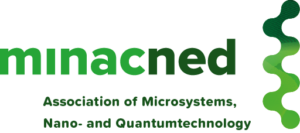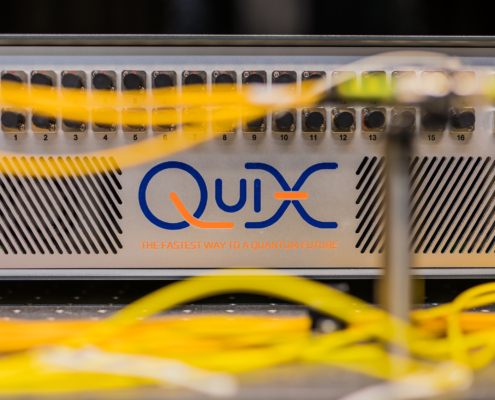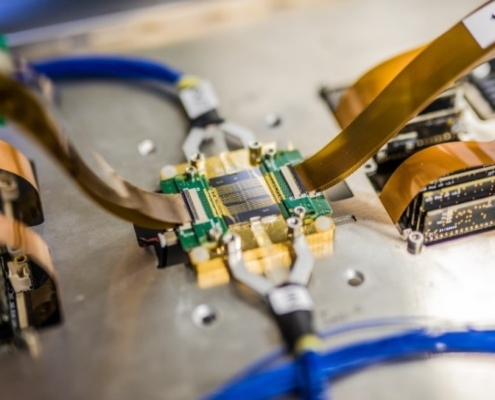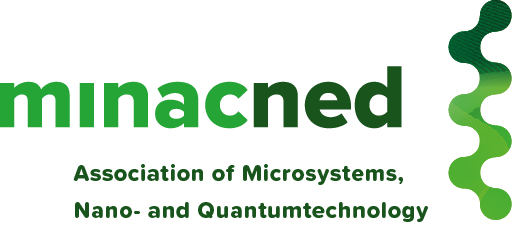From left to right: Ton van ‘t Noordende (Investor in Residence, Quantum Delta NL), Matthijs Rijlaarsdam (QuantWare). Alessandro Bruno (QuantWare), Freeke Heijman (director Quantum Delta NL). Photos by Rebekka Mell, in the DiCarlo Lab (QuTech).
Quantum Delta NL announces the launch of a two million euro micro fund called ‘LightSpeed Fund 1’. The fund will focus on supporting early stage quantum startups. Delft-based startup and participant in the LightSpeed program, QuantWare, is the first startup to receive funding.
The fund is part of Quantum Delta NL’s strategic roadmap to increase the number of successful quantum startups in the Netherlands. Currently, there are seven quantum startups in the Netherlands, and Quantum Delta NL is on a mission to see this number increase to 100 by 2027. These companies are considered to become of great value to the Dutch economy.
In pursuit of this goal, last month Quantum Delta NL launched its new initiative, LightSpeed. Lightspeed is a program connecting Dutch quantum startups in all phases, where the startups receive tailored assistance and guidance to scale up their businesses and optimize their attractiveness to top-tier investors. Specifically for the initiative, efforts were made to approach and bring in European and American funds with a wealth of experience to support startups. Lightspeed aims to create optimal conditions to build sustainable and future-proof startups.
Fund
Following today’s launch of the micro fund, managed by LightSpeed, Quantum Delta NL awards pre-seed tickets amounting to 50,000 euros each to early-stage startups in the field of quantum technology. LightSpeed adapted a modern instrument that is straightforward, founder-friendly and fills the gap in the earliest stage for quantum technology startups: the SAFE note (Simple Agreement for Future Equity). This approach gives startups the maximum flexibility needed in the earliest stages, particularly in the quantum technology space as development timelines and road to profitability extend far beyond that of classic startups. The investment does not have to be repaid, as with a traditional convertible loan or note, if a startup fails to advance.
Quantum Delta NL’s Investor in Residence Ton van ‘t Noordende clarifies: “The Netherlands has a top position globally if we look at the number of quantum technology startups. This is unfortunately not the case on the capital side as there is virtually no professional venture capital available for early stage quantum startups. Our goal with Lightspeed is to enable founders to get the best possible start of their company.”
Quantum Delta NL has currently allocated two million euros for the pre-seed tickets and intends to award 5 to 15 tickets in fiscal year 2021/2022 and 35 to 40 tickets over the total period. The budget will be increased once Phase 1 of the National Growth Fund Program is underway.
QuantWare
QuantWare, a spinout of QuTech and part of the Quantum Delft ecosystem which develops high-performance quantum processors, is the first startup to tap into the microfund as part of a larger investment round. This makes it the second success story in the LightSpeed program. LightSpeed has also supported and guided the Delft-based startup QphoX in their fundraising round, which raised two million euros in funding with the help of the LightSpeed team to bring its Quantum Modem to the market.
Ambition
Startups and building a business ecosystem are key pillars of the Quantum Delta NL-program that heard it will receive 615 million euros from the National Growth Fund in April. Among other things, the program fuels the further development of the first European quantum computer and a quantum internet, openly accessible to end users in business and social sectors, including education. McKinsey calculated that in the medium term, the program will raise the gross domestic product by 5 to 7 billion euros and create 30,000 high-quality jobs in the Netherlands.
Freeke Heijman, director Quantum Delta NL: “We want the knowledge from the scientific labs to lead to new businesses in the Netherlands and Europe. With LightSpeed and this fund, promising initiatives will get an unprecedented acceleration to scale up their idea to a startup or scale-up.”
Ton van ‘t Noordende, Investor in Residence Quantum Delta NL: “We see the micro fund as a logical extension of LightSpeed. Promising and early stage initiatives only need a small injection of capital to hit the ground running. This is proven by QuantWare which, relying on our investment and on Lightspeed’s guidance, has raised immediate market capital even before launching their company.”
Alessandro Bruno, Director of Engineering at QuantWare: “The support from this fund and LightSpeed will allow us to bring our quantum processors to market. In doing so, we are making quantum accessible to more parties. In this way, we can make a crucial contribution that allows the Dutch quantum ecosystem to build on its current lead.”
Original press release here



